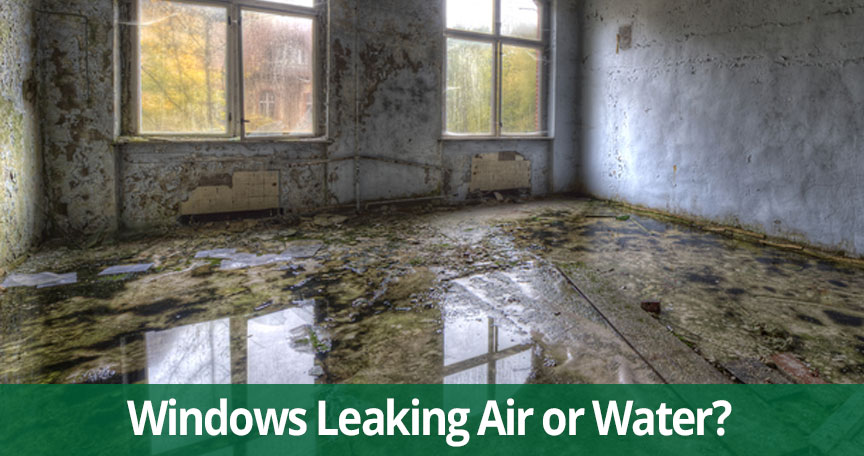MENU


The goal of the windows in your New Jersey home is to keep the weather outside where it belongs – outside. When cold and heat and wind and water are getting into your home through your windows, they’re not doing their job effectively anymore. While drafts negatively affect you’re your home’s energy efficiency and waste energy dollars, and can be an indication that you may have moisture infiltrating your home, water leaking through your windows is a clear indication that you may have a damaging or even dangerous health hazard for you and your family.
If you see water accumulating in the frame or on the sill (the ledge that protrudes from the bottom) of your window or you see discoloration on the wallboard or trim around the window, you know you have a problem. Regrettably, this is not an uncommon situation throughout New Jersey and New York and is an indication of poor window performance that can cause your energy costs to increase dramatically in winter months.
In today’s post from Renewal by Andersen of New Jersey, we will investigate the twin problems of air and water leakage and the issues they can cause in your home as as a direct result of that leakage, and how to tell where the leak is coming from.
The first step of solving any problem is diagnosing what the problem is. When it comes to windows, there are two potentially two main types of leakage: air and/or water.
Let’s look at air leakage first. How do you determine if your windows have this issue? Because you can’t see air, air leakage is often more difficult to diagnose than water leakage, which even if you don’t see it when it’s leaking, leaves behind tell-tale signs of its former presence.
Air leakage is an issue you usually feel, not see, although rising numbers on your energy bills are a pretty clear indication something’s wrong. If you find that your home, or certain rooms in your home, are less comfortable, either too cold or too warm and you have difficulty maintaining an even temperature, you likely have air leaks, otherwise commonly known as drafts. If the problem is more pronounced on windy days, you have even more evidence of leaky windows.
One of the simplest ways to find a drafty window is with a match. This test is best performed on a windy day. First, remove any flammable window coverings, curtains, blinds, etc. A drafty window is small problem compared to a fire. Light the match and carefully hold it near the edges of your window, where it connects to the wall and where the sash connects to the frame. On double hung windows or sliders, don’t forget to check the connection between the two sashes. If you see the flame move either away from the window or toward the window, you have some kind of air leak. In extreme cases, the draft may actually blow out the match. If you think you see some movement, but you’re not quite sure, extinguish the match and see if you can determine if the resulting puff of smoke goes toward the window or away.
If you’re not comfortable with the match method, there is another way, although slightly less convenient. Again, you’ll need a windy day for this test. Remove any heavy window coverings or blinds you may have and install some very light, usually sheer, curtains. The lighter, the better to see the slightest air movement. If, with no other assistance, the curtains move or flutter when no one is near them, you’ve got an air leakage problem.
Why do we care if a little air is coming through our windows? Well, in New Jersey and New York, we pay some of the highest utility rates in the country. If your spending money to heat and cool your home, you would like that money to stay in your house. Air leaks are like throwing money out the window because you’re letting the air you paid to heat and cool slip out of your house. As my father once said when I left a door open as a kid, “I’m not paying to heat the neighborhood”. You’ve got to admire the succinctness of that statement. If you’ve got air leaks, you’re paying to heat the neighborhood.
In addition to the monetary concerns, there’s also your comfort to think about. If you have air leaks, you could feel drafts when you’re sitting down to relax in your home. Do you get cold when you’re sitting down to watch a little TV or read a book even when the thermostat says you shouldn’t be? That’s likely the air movement of a draft making you feel cold.
While air leakage wastes energy dollars and can make you uncomfortable in your home, water leakage can be even more insidious. Water leakage can be a real health and safety issue that often goes unnoticed until the damage is already severe. One of the first signs of water leakage, if you don’t actually see puddles of water around your windows, is discolored paint. This is often most evidenced on the window sill or on the wallboard around your window (most often in the lower corners, but it could be anywhere). In some cases, the paint may even begin to blister and peel.
Often, you won’t see the damage on the inside of your house until the water has been leaking inside the walls for some time. In those cases, you could have a real health and safety issue and the dampness inside your walls can grow mold and mildew which can make you very sick. Moist wood is also an enticing calling card for insects like termites, who feed on wood and moist wood gives them a drink with their meal. In these cases, before long, you have structural issues as the wooden beams that are holding up your house are undermined and the structural integrity of your house is compromised.
Water infiltration inside your house can also cause collateral damage to your window and even your floor and furnishings. Worse yet, water tends to travel, or move along structures present inside a wall, like pipes or electrical wires. If water reaches an exposed wire, like in an outlet or junction box, it can cause a spark, which can short out an electrical circuit or even cause a house fire.
If you see discolored or peeling paint, don’t make the mistake of simply painting over it. For one thing, your new paint job will likely not last long as the water is still getting in, and on the other, the damage will continue to progress. You need to call in a professional to deal with water leaks as soon as practically possible.
It should be said here that if you see signs of either air or water leakage around your windows, you likely have the other. If water can get it, air certainly can as well.
If you have severe air or water leakage issues around your windows, you should call in a reputable contractor familiar with windows to help you determine where the leaks are coming from and what you can do to remediate the problems as soon as possible. Be advised that a simple visual inspection of the area may not be enough to determine the extent of the problem. Your contractor may need to open up entire walls to find the source and determine how much damage has already occurred and remedy those situations. It’s important that you act quickly, as every day that the problem goes untreated means that the problem gets worse (and more costly).
Do you need more information on how leaky windows could be affecting your home and your comfort? Renewal by Andersen of New Jersey Island is your local replacement window expert. As a subsidiary of Andersen Windows, we’ve been manufacturing windows for generations, and nobody knows the business like we do. Be sure to contact one of our experienced design consultants who will help you through any step of your window experience. Call us at 866-609-5033 for a free design consultation.
Check out these posts for more information on whether to repair or replace your home’s windows: